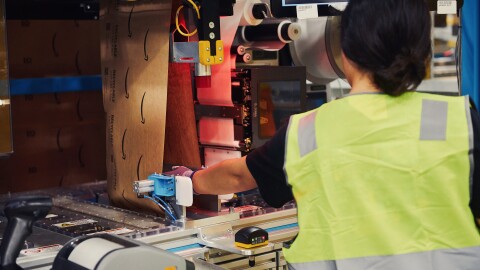Amazon and Global Optimism are announcing that Best Buy, McKinstry, Real Betis, Schneider Electric, and Siemens have joined The Climate Pledge, a commitment to be net zero carbon by 2040—a decade ahead of the Paris Accord’s goal of 2050.
These new signatories to The Climate Pledge agree to:
- Measure and report greenhouse gas emissions on a regular basis;
- Implement decarbonization strategies in line with the Paris Agreement through real business changes and innovations, including efficiency improvements, renewable energy, materials reductions, and other carbon emission elimination strategies;
- Neutralize any remaining emissions with additional, quantifiable, real, permanent, and socially-beneficial offsets to achieve net zero annual carbon emissions by 2040.
“From hurricanes to forest fires, we are seeing concrete evidence of climate change impacting the planet even sooner than expected. Every company has a role to play in fighting climate change, and we welcome these new Climate Pledge signatories who are stepping up and committing to reach net zero carbon by 2040,” said Jeff Bezos, Amazon founder and CEO. “They are showing important leadership in accelerating the path to zero carbon to protect the planet for future generations.”
To achieve a net zero carbon footprint, Best Buy will continue to measure, manage and decarbonize its emissions, increase the energy efficiency of its operations, and invest in carbon offsetting projects. Since 2009, the company has reduced its carbon emissions by 56% through investments in LED lighting, controls systems and hybrid vehicles. The company has also undertaken investments in utility-scale solar generation like the Best Buy Solar Field, which powers the equivalent of 260 Best Buy stores each year. Through its previously established science-based target, the company aims to reduce emissions in its operations by 75% and help customers reduce product emissions 20 percent, saving the company $5 billion on utility costs by 2030. And as it looks to the future and meeting the 2040 requirements of The Climate Pledge, Best Buy’s focus areas may include fleet electrification, energy efficiency, renewable energy investments, and the development of carbon offset projects.
“We are a purposeful, values-driven company, with a long history of environmental work that includes meaningfully reducing our carbon footprint and helping our customers do the same,” said Corie Barry, Best Buy CEO. “We are proud to take the next step by committing to the Climate Pledge. Simply put, our customers and employees expect this degree of commitment from us and the planet demands it.”
McKinstry, a U.S. engineering, construction and energy services firm, has a three-fold plan. Focused on its operations first, McKinstry will reduce its net greenhouse gas emissions 50 percent by 2025 and reach net zero carbon by 2030. McKinstry will use its impact and influence to support community organizations who are leading approaches to preserve the planet.
It will also work with building owners and operators to deliver more buildings that aim for zero-carbon, energy-sharing, high-efficiency operations, and optimal building-to-grid interactions. This leads to occupant behavior that helps to transform buildings from blind energy consumers to valuable assets that serve the grid.
“Buildings account for 40 percent of energy use in the United States, 36 percent globally,” said Dean Allen, McKinstry CEO. “Emerging, complex building technologies are unlocking the potential to radically reduce carbon emissions and operate buildings with startling efficiency. It will take working together, across industries to deploy these technologies and decarbonize the global building stock and dramatically improve energy efficiency. Working with other Climate Pledge companies, I believe we can meet this goal and drive real, lasting change.”
Real Betis, a professional football club based in Seville, Spain, has measured its carbon footprint and is implementing plans to reduce its emissions while at the same time purchasing carbon offsets from certified climate protection projects. In an effort to reduce its carbon emissions, the club is installing a “smart illumination system” in its 60,000-capacity Estadio Benito Villamarín stadium and is attempting to reduce its reliance on single-use plastic. It is also focused on serving as a role model for its fans: for the upcoming season, Real Betis is developing a list of sustainable initiatives to help fans reduce carbon emissions.
“At Real Betis, we are committed to tackling climate change,” said Ramón Alarcón, Real Betis General Business Director. “We are also helping to raise awareness to address the climate crisis, by engaging with our players and fans. We understand that climate change is a threat to the livelihoods and the wellbeing of everyone on the planet, and we are committed to doing our part. We are very excited to be the first football Club in the world to join this program, and we can’t wait to work with Climate Pledge companies to ramp up our efforts.”
We are very excited to be the first football Club in the world to join this program, and we can’t wait to work with Climate Pledge companies to ramp up our efforts.
Fighting climate change has long been at the heart of Schneider Electric’s strategy and innovation roadmap, much ahead of its COP 21 Carbon Pledge endorsement. For Climate Week 2020, Schneider is accelerating its own carbon neutrality commitments and reaffirming it will be carbon neutral in its operations by 2025 and have net-zero (no offset) emissions by 2030. It is also promising to have all of its products be carbon neutral by 2040, with full end-to-end neutrality, as well as having a net-zero supply chain by 2050. Schneider’s corporate pledge was amongst the first +1.5° degrees Celsius roadmaps approved by Science Based Target Initiative (SBTi).
“Sustainability is at the core of everything we do at Schneider, and digital innovation is critical to address the challenge of climate change,” said Jean-Pascal Tricoire, Schneider Electric Chairman and CEO. “We will progress faster towards a sustainable and inclusive world if we progress together. This is why we joined The Climate Pledge - to deliver carbon neutrality.”
We will progress faster towards a sustainable and inclusive world if we progress together. This is why we joined The Climate Pledge - to deliver carbon neutrality.
Siemens’ goal is clear: all production facilities and buildings worldwide are to achieve a net-zero carbon footprint by 2030. To reach this objective, Siemens is focusing on four levers: green energy procurement, improving energy efficiency, decentralized energy systems (e.g. photovoltaics on factory rooftops), and the electrification of its car fleet. Besides, Siemens has initiated a new Managing Board compensation system that is also linked to sustainability targets, such as CO2 emissions reduction targets.
“Climate Change is one of humanity’s greatest challenges of our time. Businesses need to lead the way towards accelerated decarbonization. In September 2015, Siemens became the first global industrial company to commit to achieving carbon neutrality for our global operations by 2030. Today, we reemphasize our commitment to this goal and are looking forward to joining forces with other Climate Pledge companies to help ramp up global efforts,” said Joe Kaeser, Siemens AG president and CEO.
Today, we reemphasize our commitment to this goal and are looking forward to joining forces with other Climate Pledge companies to help ramp up global efforts,
“The Paris Agreement set out a unifying roadmap for all countries and all people to address the climate crisis by taking action. The IPCC has informed us that we cannot warm the planet beyond 1.5 degrees Celsius and that the faster we achieve net zero emissions, the better.” said Christiana Figueres, the UN’s former climate change chief and Global Optimism founding partner. “By joining The Climate Pledge, signatories are not just making a statement of commitment to the future, they are setting a pathway to significant actions and investments that will create jobs, spur innovation, regenerate the natural environment and help consumers to buy better starting now. This is what leadership looks like in resetting the global economy.”
Last year, Amazon and Global Optimism co-founded The Climate Pledge, a commitment to reach the Paris Agreement 10 years early and be net-zero carbon by 2040. Eleven organizations have now signed The Climate Pledge including: Amazon, Best Buy, Infosys, McKinstry, Mercedes-Benz, Oak View Group, Real Betis, Reckitt Benckiser (RB), Schneider Electric, Siemens, and Verizon—sending an important signal that there will be rapid growth in demand for products and services that help reduce carbon emissions.
For more information visit www.theclimatepledge.com.











